Erstellt am: 13. 7. 2010 - 10:20 Uhr
Snapshots of South Africa
* By the way, DJ Shadow, Crystal Castles, and Tesla Boy were the best
Just in the spirit of full disclosure, I confess I am writing this, not from some township in the Western Cape of South Africa, but in fact from Novi Sad, Serbia, where I have been attending the Exit Festival.*
And yet if I close my eyes, I feel that I could still be out there somewhere, hanging out with jackass penguins or visiting a shebeen. It is odd to think that all of these people and places are so far away from me now.
I'll take you on a little tour. Where better to start a journey through the Western Cape (the region I was visiting), than at a McDonalds?!
Authentic African Food
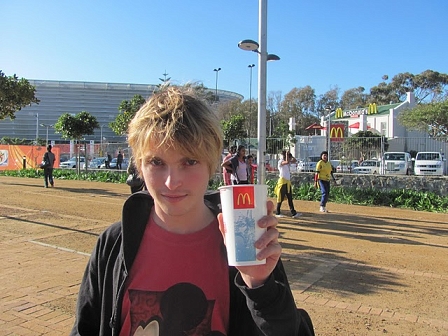
Johnny Bliss, 2010
It is pretty much public knowledge at this point that informal traders were banned from selling food and souvenirs outside the stadiums during the World Cup. FIFA only wanted their sponsors to profit off the games.
On the way to a game I was hungry, but I didn't want to eat something homogenous, that I could get anywhere in the world. I was in South Africa, damn it, and I wanted some authentic African cuisine!
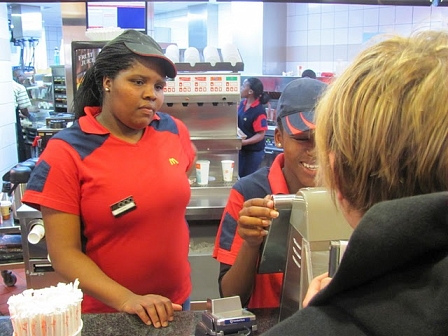
Johnny Bliss, 2010
Listen here to my (sadly doomed) attempts to get some local food at the sponsored restaurant in front of the stadium, before the game:
Cape Town's Other World Cup
Fortunately, the FIFA World Cup was not the only World Cup in town.
Comparatively unknown, there was also the Poor People's World Cup, which took place on four different Sundays (starting on June 13th), each occasion on a football field in a different marginalized community, and organized by the Western Cape Anti-Eviction Campaign.
In the early morning, overcrowded mini-bus taxis drove in to bring together 36 teams from 40 communities, each representing a different country. In terms of local culture, there was not really much more I could ask for.
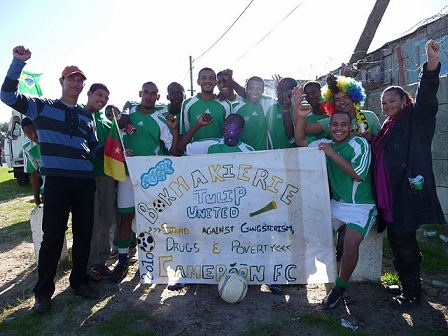
Rosalie de Bruijn, 2010
Rosalie de Bruijn, 2010
The opening tournament of the Poor People's World Cup brought me face-to-face with my own fears and stereotypes. I remember thinking, as I walked onto the field and a bunch of little children swarmed around me to beg for money, what am I doing here? This is not my place!
Fortunately I eventually got over THAT and when I did, I noticed I received decidedly fewer weird looks from the locals as well. My rising level of comfort was apparently written all over my face.
After a set of speeches from local and international housing rights activists, the matches finally began. Another outsider and I decided to support Team Palestine, out of the temporary relocation area (TRA) of Blikkiesdorp.
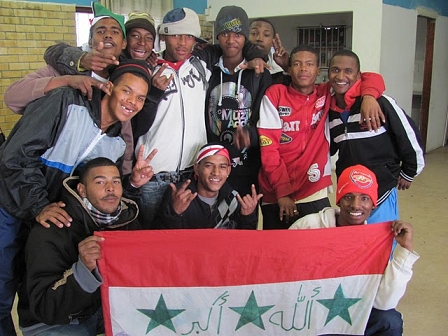
Johnny Bliss, 2010
Listen here to my coverage of the Poor People's World Cup:
Johnny Bliss, 2010
"Folks are living in what looks like and feels like a concentration camp, with tin shacks, and [...] it's not a situation that is fit for human life," said New York-based anti-eviction activist Michael Primo, just one of a chorus of voices decrying the conditions inside Blikkiesdorp.
One night I thought I would attempt to verify these claims, and went to sleep at the shack of a community leader in the so-called Tin Town.
After I returned to 'regular' society, I wrote a web story about the experience, which I urge you to read here.
Some additional voices from the struggle:
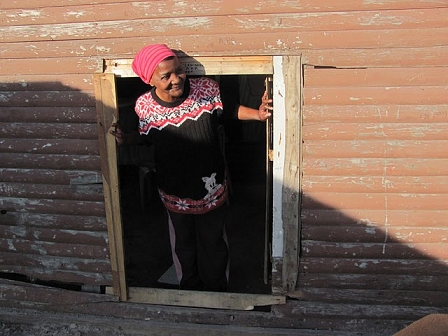
Johnny Bliss, 2010
There Be Elephants
Die WM 2010: Die Übersicht.
Alle FM4-Stories zur WM, alle Rundherum-Geschichten aus Südafrika, wie zum Beispiel das grandiose Südafrika-ABC von Anna Mayumi Kerber.
Of course, people from impoverished communities are not the only ones lacking representation at the FIFA World Cup.
One of the many other elephants hanging out in the living room are the entire, you know, opposite sex. I pose to you: this competition is not considered the "men's" World Cup, it is simply THE World Cup.
I asked one of my contacts, an activist and coordinator named Mari, who works with an international sports and development-related non-profit organisation called Score, to weigh in on the subject.
"The whole thing with the World Cup is that even though it's the Men's World Cup, that is not something that is ever spoken or ever said, so it sort of perpetuates the idea that Football is default a men's game, and that women's football is in a way a less valuable alternative to that.
"Because football is such a male domain in South Africa, and because of the incredibly high levels of gender-based violence, you do see that women in football who do not fit the stereotypical, heterosexual feminine long blond hair and lots of make-up, [often] become victims of violence in their own communities. [...] Lesbian women in South Africa every day are getting abused and raped and sometimes also killed."
I'd heard something about a lesbian football team in the nearby township of Khayelitsha called Free Gender. I managed to organize a time to meet with the girls at their sports clubhouse.
There was only one problem: No street signs. Even with a map it can be nearly impossible to find your way to an unknown location...
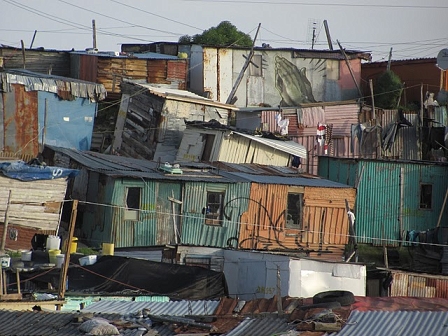
Johnny Bliss, 2010
I count myself as terribly lucky that I had a guide, a local who was willing to show me around and go foolhardily into new situations. Without his expert assistance and knowledge of the roads, I doubt seriously that I would have ever gotten anywhere near the clubhouse.
Somehow, we did ultimately find our way, and I found myself shortly thereafter in interview with several team members.
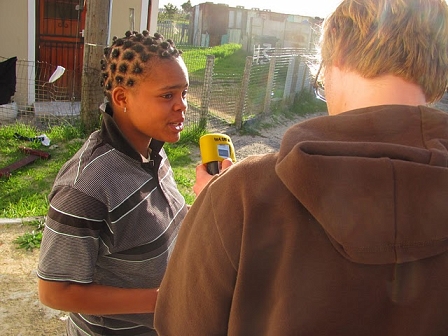
Johnny Bliss, 2010
"I'm a big striker of this team, also a midfielder. Best player," laughed player Sihle Mgwatyu when I approached her, "in the best team in Khayelitsha. [But] we are facing many difficulties because of people don't want to understand being lesbian. Sometimes we cannot actually go on streets alone, because we are scared of people who are going to say wrong things about lesbians, and do wrong things to us, you know..."
"Being in this community is nice," defender Olwethu Bomela told me. "We are trying to work together with the other people, not only the lesbians. It's only a few here in this community, people who are homophobic. In fact, people who are homophobic in this community, it's only the youth. But the elders do understand and they are working with us. It is getting better."
Listen to my report on Free Gender here:
There Be Penguins
But I knew from the very beginning, my coverage would not be complete until I visited one last informal settlement, uniquely located in a wealthy area some hours out of Cape Town city center, called Boulders Beach.
I went to visit with some of the representatives of the half-white, half-black community settled at the seaside, and attempted to get some answers.
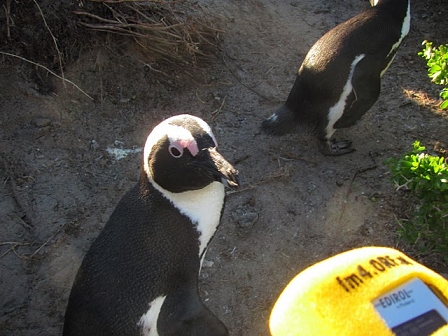
Johnny Bliss, 2010
It's pretty fantastic to encounter wild penguins in a warm and beautiful area like the South African seaside. They wander around freely, are very nearly friendly to humans (with some exceptions!), and have -- according to my sources -- only been in the region for a little less than thirty years.
However, they don't seem to care at all about the World Cup.
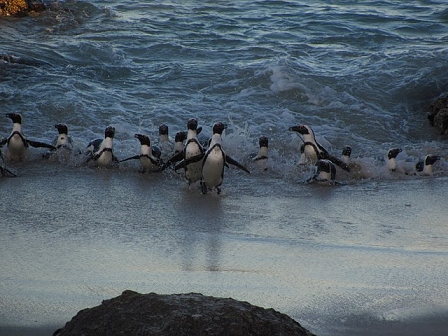
Johnny Bliss, 2010
Odds and Ends
During the all-too-short period I spent in the Western Cape, I was regularly producing short audio pieces to reflect the mood on the streets. Below I have chosen to include some highlights.
Ghana vs. Germany vs. Me
On the 23rd of June, I decided to go to the Paulaner Bräuhaus (a German restaurant and bar) in Cape Town's Sea Point area, so as to watch their game against Ghana. By that point, I'd already become quite biased...
Home Sweet Homeless
When the World Cup came to town, a lot of people suddenly found themselves getting kicked out of their apartments by their landlords. I asked some people who lost their homes, what happened?
Vuvuzela Lessons
Just in time for the World Cup to end, I bought myself a vuvuzela. Unfortunately I just don't seem to have a knack for musical instruments!


